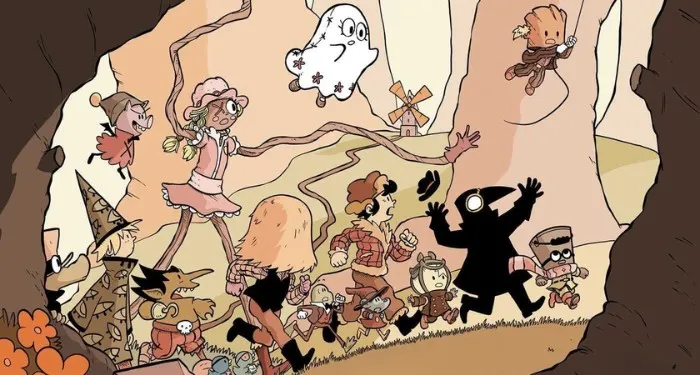Let’s start with some comparative anatomy. You and I have bones. An octopus doesn’t. It has three hearts—two for its gills—pumping coppery blue blood. Instead of gills we have lungs, and our lone heart pumps iron-based red blood. Bony skulls protect our large, unified brains. An octopus’s brain is distributed throughout its soft, amorphous body: nine brainlike nerve clusters, one at the base of each arm and another in its head. Yet the word “head,” when applied to an octopus, is a little puzzling. It’s all too easy to think of everything above the tentacles as its head, where there appears to be plenty of room for a sizable globular brain. This is a cranial shape we recognize from many sources, like the invading Martians in the 1996 movie Mars Attacks! Nearly everything about it says “head” to us, even if it also says “alien.”
But it’s not a head. It’s a mantle.1 What looks headlike to us actually encloses—mantles—nearly all of an octopus’s organs: its digestive, reproductive, and circulatory systems, which have functions roughly similar to ours. It also contains some distinctly nonhuman parts, like a poison gland, an ink sac, and a funnel for breathing and propulsion. You can have a pretty good feel for octopus anatomy and still be susceptible to the impression that this mollusk—for octopuses belong to the phylum Mollusca—has an immense yet oddly indeterminate occiput, as erect sometimes as a hot-air balloon rising on a cold morning from the desert floor and sometimes as floppy as an old beret.
Comparative anatomy is always worth thinking about from both directions, so that we become the compared as well as the comparing. After all, our sense of being normal relies on our chronic failure to notice how strange as a species humans really are—as strange from the cephalopod point of view as cephalopods are from ours. What would a discerning Octopus vulgaris—the common octopus found in temperate and tropical waters around the globe—make of Homo sapiens? If that question seems indulgent, let me quote Peter Godfrey-Smith, an Australian philosopher who’s spent several years studying gloomy octopuses (Octopus tetricus) at an underwater site called Octopolis in Jervis Bay, south of Sydney. His latest book—Living on Earth: Forests, Corals, Consciousness, and the Making of the World—is the third in a brilliant trilogy, including Other Minds and Metazoa, about the evolution of consciousness. On this subject, he writes, “the last thing we should do is fail to be sufficiently imaginative.”
The marine biologist David Scheel concurs. Scheel is a sometime collaborator of Godfrey-Smith’s and the author of Many Things Under a Rock: The Mysteries of Octopuses.2 His research in British Columbia and Alaska involves giant Pacific octopuses (Enteroctopus dofleini), which he finds “in the intertidal and on foot, during the lowest low tides early in the summer and midwinter” with the help of Native Alaskan octopus hunters. Scheel defines anthropomorphism as “giving human shape to animal sensory and behavioral worlds.” It can be misleading, but, he suggests, that doesn’t mean it’s always wrong. Nor is it always imaginary: “Universal ecological needs can lead to similarities in how organisms function. All animals, including humans, also share a deep evolutionary ancestry that leads to many surprising parallels.”
Godfrey-Smith and Scheel work in the borderland of philosophy and science, where “sufficiently imaginative” meets “sufficiently objective.” What they describe isn’t conventional storybook anthropomorphism or the subtler, disconcerting kind evident in so much science and nature writing. Instead they have in mind a restrained, balanced version, a tool for truly bidirectional thinking, not just a means of sprinkling sentimentality, like emotional Splenda, over the landscape. Like Scheel, Godfrey-Smith observes that the real flaw in anthropomorphism is thinking “that all forms of experience must be human-like in various ways.” As they characterize it, anthropomorphism is a way of discovering difference by exploring the similarity between what seems anthropomorphic in octopuses and what in us, to coin a word, seems octopomorphic.
So what would a common octopus find peculiar or interesting about humans, besides the astounding fact that we don’t live underwater? For one thing, we’re incompressible. Our body shape is basically unalterable, and thanks to our rigid architecture, we can’t squeeze through an aperture narrower than the width of our hips or shoulders. (An octopus can—and will—siphon itself through an opening no bigger than its beak.) Our physiological tools for grasping—two hands, with opposable thumbs—are a very big deal among mammals. But they would be unimpressive to a creature with nearly two thousand suckers capable of tasting, touching, and adhering, arranged in rows on arms with their own brainlike neuron clusters. And when it comes to camouflage? An octopus can vanish in plain sight against almost any background, while humans, lacking chromatophores in the skin,3 are doomed to live forever unhidden. Moreover, octopuses have the ability to discard an arm that’s been severed by a predator—and then regrow it. Us? Not so much.
And then there’s the matter of movement. Humans are inherently stiff and angular whether we’re walking, running, or swimming because our limbs are inflexible bone-beamed levers, connected at hinges we call “joints.” But in the aqueous, low-gravity world of octopuses, motion is fluid and arrhythmic. The radical strangeness of octopuses is never more startling than when you see one sidling in its benthic manner along an underwater contour. In motion it looks less like a unified organism than a disorderly swarm of tentacles or a knotted conclave of eels led first by one arm then another as it billows along, just slightly more substantial in appearance than the “chestnut-brown” ink cloud it emits when alarmed. Octopuses are “good at navigation,” Godfrey-Smith writes, but with nine brains and eight arms to lead the way, there’s almost nothing direct or linear about their progress across the ocean floor or along what he calls the “jumbled animality” of a coral reef. To us, forward means straight ahead, the direction our eyes point and our limbs and joints work best. But to an octopus, forward can be found in any direction. “Its arms are partly self,” Godfrey-Smith notes. “But from the central brain’s perspective, they are partly non-self too, partly agents of their own.” Imagine trying to move when your eyes work independently, like an octopus’s, and each of the eight limbs girdled around you has a vestigial opinion about where to go, and how, and why. For that matter, imagine looking down and discovering that whatever you think your brain is planning, your two legs have made quite separate plans and are already underway in different directions.
Seemingly haphazard movement of this kind—unlike jetting through the water column—is as much a form of exploration as a means of travel. Every tentacle, fingering its way tentatively outward, looks and acts as though it’s independently alive, something Scheel realized when he saw a freshly severed octopus arm trying to crawl out of a fisherman’s bucket in Alaska. “Zombie determination,” Scheel calls it, because it seemed to him like purpose without awareness, “absent-minded” activity. And yet in this separate animation he perceives “the evolutionary embodiment of the wisdom of the octopus.” In humans, curiosity usually begins as a mental stirring, but in octopuses, Scheel argues, it’s a function of bodily design. In a sense, curiosity and intention are dispersed throughout an octopus’s tissues—right out to the tips of its tentacles. Inquisitiveness, he writes, “is built into the octopuses’ anatomy.”
All of this only begins to suggest the gulf that divides humans and octopuses. Our most recent common ancestor was, in Godfrey-Smith’s words, “a worm-like creature” in the Ediacaran era, some 600 million years ago. And yet no matter how uncanny octopuses are, there’s something oddly familiar about them, something that helps us feel connected as we look across clades, from our home in the Vertebrata to the realm of invertebrates. As the zoologist M.J. Wells put it nearly fifty years ago, evolution has somehow created “a mollusc that a primate can recognize as a fellow creature.” When Darwin in 1832 came upon a common octopus in the Cape Verde Islands, it “seemed fully aware that I was watching it.”4 And if you’ve ever met one in the wild, you know that an octopus doesn’t just look at you. It considers you. Instead of the relatively flat gaze you see in a parrotfish or barn swallow or black bear, you meet a gaze with surprising depth, emanating from what Godfrey-Smith calls “a body of pure possibility.” To encounter an octopus is to be implicated in a question about being that engulfs you both.
In such an utterly alien creature—alien in form, motion, habitat, and almost everything else—what is it we recognize? What could possibly be familiar? The answer is intelligence—“clammy intelligence,” to borrow an apt phrase. Here, for instance, is the philosopher William James writing to his wife, Alice, in July 1889 about four octopuses he saw at an aquarium in Brighton, England. “I wish,” he wrote, “we had one of them for a child—such flexible intensity of life in a form so inaccessible to our sympathy.” There’s no finer four-word summary of an octopus’s nature than “flexible intensity of life.” And yet in a way James seems to be contradicting himself. To imagine having one as a child suggests that sympathy for the octopus’s form isn’t quite as inaccessible as he supposes, thanks to its inquisitive intensity.
Thinking about intelligence in other species is something humans almost never do well. It’s hard enough to define “intelligence” in us, and across species, Godfrey-Smith notes, “there is no single scale on which intelligence can be sensibly measured.” We have no idea what the experience of intelligence—how it’s shaped or used or felt internally—might be like in creatures we suspect of being intelligent (sometimes including other humans). Unfortunately, too, humans tend to be deep-dyed in the objectively false assumption that our intelligence represents a teleological goal or evolutionary peak. And of course many people cling to the ridiculous notion that comparing humans to animals—as if we weren’t animals—somehow demeans us and threatens our status as uniquely, even divinely privileged organisms on this planet. Does “intelligent” mean an octopus actually thinks? Is it conscious as well as sentient, not merely feeling but aware of what it feels? If an octopus could detect intelligence in us, would that be a sign of its own intelligence? Is that why it seems to examine you? These are all good questions, with only equivocal answers. Yet nearly everyone who meets an octopus concludes that its behavior is “strikingly intelligent.”5
Which brings me to one last point of comparison. Most octopuses live only a year or two, depending on the species.Humans, obviously, live much, much longer. And because length of life and intelligence seem connected in some way, a question naturally arises. What use is intelligence in such a very short life, especially since, as Godfrey-Smith puts it, “the machinery of intelligence is expensive, both to build and to run”? This conundrum has led to some questionable conclusions, including “a hypothesis of ‘accidental intelligence,’” as though octopuses had mistakenly developed “‘too much brain’ for animals living such brief and asocial lives.” But if their intelligence is accidental, then in what sense is human intelligence not accidental? Much as we marvel at the brief lives of these fascinating creatures, octopuses might marvel at the fact that humans have to bear the burden of being intelligent for decades on end. Could it be that we have “too much brain” for animals living such long and complex lives? Or too much life for the brains we have?
Globally, there are some three hundred species of octopuses living everywhere from shallow, light-filled inshore waters to the total darkness of the hadal zone, seven thousand meters deep. But wherever you find them, they dwell on the other side of an evolutionary canyon from our single species. “If we want to understand other minds,” Godfrey-Smith writes, octopus minds “are the most other of all.” The connection we feel occurs not because there’s a shared history or close genetic kinship or even a physical “correspondence between the parts of their brains and ours.” It occurs because “evolution built minds twice over” from scratch, to entirely different plans.
And yet as remote as octopuses are from us, the fact remains that “Earth and its oceans made us both.” Or, as Godfrey-Smith puts it, “the mind evolved in the sea.” His enduring question is how? How did the wisp in ourselves that we call intelligence arise from the physical matter of life itself? To grasp the importance of this difficult question, ask yourself: How do the utterly immaterial, unsubstantial thoughts passing through your mind happen to occur in a body made of unthinking cells? What did “mind” originate from in the long, long pre-mind history of life? Along what pathways?
In his trilogy, Godfrey-Smith offers readers a fantastic voyage into the evolving interiority of ancient sea slugs and cnidarians en route to cephalopods hundreds of millions of years later and to us—hundreds of millions of years later still. What interests him isn’t the content or experience of interiority in these creatures, for those are essentially unknowable. He’s interested in how life evolved the organic tools that make perception possible, as well as the ways perception and action shape each other in an organism. As he explains in Living on Earth, whatever else an animal may be, it’s always “a nexus where perception and action meet.” How they meet can be an indicator of intelligence, because, in Scheel’s words, “novelty and flexibility of response are bound by cognitive ability.”
We infer that octopuses are intelligent because they display “an anarchic bodily embrace of novelty,” writes Godfrey-Smith. They’re “behaviorally ‘open.’” In other words, “an octopus can readily manipulate objects that no octopus has ever manipulated before.” They may not have “ruminative” minds, but neither are they merely curious. Their “mentality”—if that word applies—is made up of many different characteristics, including what Scheel calls a “flexibility of methods”: “curiosity to investigate, a fearsome patience in persisting to the end, together with the will to abandon one approach for another and another, until the meal is won.” You may doubt whether they’re intelligent, but in the cognitive philosopher Daniel Dennett’s words, your doubts “are apt to be grounded by, perhaps overwhelmed by, actual interactions with octopuses.”
Octopuses have been having something of a cultural moment recently, thanks mostly to Craig Foster’s Oscar-winning documentary, My Octopus Teacher (2020).6 Like his film, Foster’s memoir, Amphibious Soul: Finding the Wild in a Tame World, embodies a conceit that often flaws nature documentaries as well as nature and popular science writing. It can be summed up in a sentence: let me show you nature by showing you my feelings, which I’ve projected onto the natural world. Wonderful as Foster’s underwater footage is, we learn far more about his shifting emotional states than we do about the life and habits of the octopus he calls his teacher. (I’d like to see an octopod-directed film called My Human Student.) Foster is a remarkable cinematographer and an accomplished free diver who swims, sans wet suit, in the very chilly waters of False Bay along the Cape Peninsula in South Africa. But his work—on film and paper—exposes a problem with glimpsing something almost human in octopuses. That hint of resemblance encourages an easy, almost gratuitous sense of familiarity, even intimacy. In Foster, it engenders an anthropomorphism driven by the powerful tide of his own desire.
Our emotions can give us extraordinary insight into ourselves, but they aren’t very useful when it comes to understanding a creature from a different species. And yet emotions are often presented as a superior, intuitive substitute for actual evidence or careful thinking—an alternative to rationality instead of a useful counterpart, as if what we feel were somehow closer to the root of what it means to be human than the way we think. The result in Amphibious Soul is a kind of philosophical quicksand: one moment you’re on solid ground, and the next you’re up to your knees and sinking, with no help in sight. Foster is an impassioned observer, but what he observes he registers almost entirely through his feelings, or what he chooses to tell us about them. The bedrock of his thinking is this: it doesn’t matter what you believe as long as you believe it strongly enough. That dangerous philosophical placebo has never been true—what you believe makes all the difference, as evidence from around this burdened planet (and throughout human history) tells us. This raises one of the most important points of divergence between humans and every other species on Earth, including octopuses: as far as we know, animals believe nothing, unlike humans, who believe thoroughly, often blindly, especially in the power of belief, which so often gets in the way of perception and common sense.
More than anything, Foster hopes to be “washed clean in nature’s cauldron,” though the word “cauldron” implies being boiled rather than washed. He cherishes the thought of reconnecting himself with an ancient, prehistoric wildness once inherent in humans. He assumes that we’ve long since lost an original wildness in ourselves, having been “tamed” over millennia by civilization. Perhaps, he says, animals “remember us as we once were—nomadic, wild, free.” This is wishful thinking, to put it mildly. It’s also pure, undiluted Rousseau. The result is a kind of sonorous vacuity. Some of what Foster says about humans and wildness might form the basis for hypotheses worth examining. But they’re not hypotheses; they’re assumptions. And they lead us almost nowhere except back to Foster and his feelings, especially when he speaks of his “authentic self” or his “primal mind” or his “Mother Mind.” Sincere, yes. Ardent? Unquestionably. Useful? Doubtful. Ascertainable? Unlikely.
Both Amphibious Soul and My Octopus Teacher are the work of a man who believes that he’s misplaced—or perhaps never inherited—the essential version of himself. As testaments to Foster’s own inner struggle, his memoir and movie do the work we might expect of them: they show us an author and filmmaker questing to find himself. Or rather, they do the work we might expect of them if we weren’t led to think they were going to be mainly about octopuses. Again and again in Amphibious Soul, Foster laboriously harvests the hoariest platitudes, which also surface, often implicitly, in My Octopus Teacher. He concludes, for instance, that “nature is priceless.” In reaching that anodyne conclusion, he writes, “If you gave a bunch of our best scientists a billion dollars they’d be hard-pressed to make a fly from scratch.” That is not what scientists do and not how science works. I’d like to think Foster knows it, but that sentence makes me wonder.
In Amphibious Soul the mood underlying Foster’s often epiphanic prose is one of mourning, a natural offshoot of his thoroughgoing romanticism. He feels what he calls “the sadness of the severing of our species from our Mother—the great forgetting.” His view of life has at its heart the untestable assumption that our species suffered a primal trauma early in its history, a trauma he’s trying desperately to reverse within himself. And onto that one accommodating octopus in the kelp forest of False Bay—his octopus teacher—he places the burden of de-traumatizing Craig Foster. “This creature has no limits when it comes to teaching me and expanding my mind,” he writes, a sentiment that might be more valuable in its reciprocal form, in which there are no limits to what a human can learn from an octopus.
All of this is well intentioned—as the language of self-help (and self-pity) usually is in memoirs. You can’t blame Foster for what he feels, but you can certainly ask whether what he tells us about his feelings helps us understand much besides the shape of his own interiority. “All creatures,” Foster writes, “are manifestations of life—each a piece of the shining totality that is nature, or God, if you like.” This sounds like the kind of verbal cymbal crash that’s meant to mark a philosophical climax. But it’s a jumble, a mix of misread Spinoza, bad theology, and the terribly obvious—“All creatures are manifestations of life”—shoved together and filtered through Foster’s feelings, which freshen within him thanks to the gaze of a common octopus and the cold, cold water off the coast of South Africa.
The otherness of an octopus is an excellent reminder of the ways in which we are other too. Social as we are, we’re also a solipsistic species. It’s terribly easy to get lost in ourselves, to be sure that existence is what we perceive it to be and nothing more. We need repeated reminding that life is perceived and experienced (and understood) differently by other species—in ways that are not humanlike. Just as Darwinian evolution shattered the idea that humans stand apart from nature—a separate creation, as in Genesis—so the idea that other species see the world very differently from the way we do helps us imagine what it might mean to step beyond the flickering campfire of our own perceptions. Everything about an octopus tells us that its version of the “shared reality” we inhabit is radically different from our own. And as Godfrey-Smith notes, the thought that we’re “responding to only a small sliver of what is going on—and other animals will respond to a different sliver and process it differently—is not an easy idea to take on board.” And yet it’s one of the most important things we can know about the natural world and our place in it.
A brain, he writes in Metazoa, is “an organ of a biologically surprising kind,” so perhaps it shouldn’t surprise us that humans and octopuses developed brains that, in their surprising intelligence, sometimes seem to recognize each other. Life is “a pattern that exists embedded in an energetic flow, one that begins and ends outside of the organism” in a habitat shaped by the presence of other organisms. “Subjects inhabit ecologies containing other subjects,” he writes in Living on Earth. It matters greatly how we understand that fact. It’s one thing, Scheel writes, “to reflexively assume that, clever as octopuses are, they have complex inner lives. It is something else to defend that scientifically, and to fully absorb that understanding is yet another.” Scheel’s distinction between scientific methodology and reflexive assumption sums up the difference between him and Godfrey-Smith on one hand and Foster on the other. The hard part, as Scheel notes, is absorbing what we can learn from octopuses about the way we fit into the world around us. Their intelligence is an evolutionary venture in “lone idiosyncratic complexity,” whereas ours is an evolutionary venture in social idiosyncratic complexity. Understanding the difference means stepping well beyond the assumptions that come so easily to us.
One last point. It’s worth remembering that the intelligence we recognize in an octopus is not the kind we possess. To overlook or minimize the differences is to miss seeing how strange life really is. “We can think of ourselves,” Godfrey-Smith writes, “as part of life as a whole” and “a material continuation of what was here before.” These are sentiments that Foster might agree with. There are many ways to express the wholeness of biological life, a wholeness that Amphibious Soul and My Octopus Teacher try to envision. But I greatly prefer Godfrey-Smith’s version: “I want to defend an orientation that embraces, and stays with, the idea that we, the world’s living agents, are all here together, as parts of a single system.” All here together, we certainly are, and the best way to glimpse the wonder of that isn’t to take it for granted. Octopuses are astonishingly beautiful creatures. To us, they have this added beauty: they help us unsettle ourselves.



















 English (US) ·
English (US) ·